初中英语时态前80个(答案+讲解)
(英语)初中英语动词的时态专项训练及答案及解析
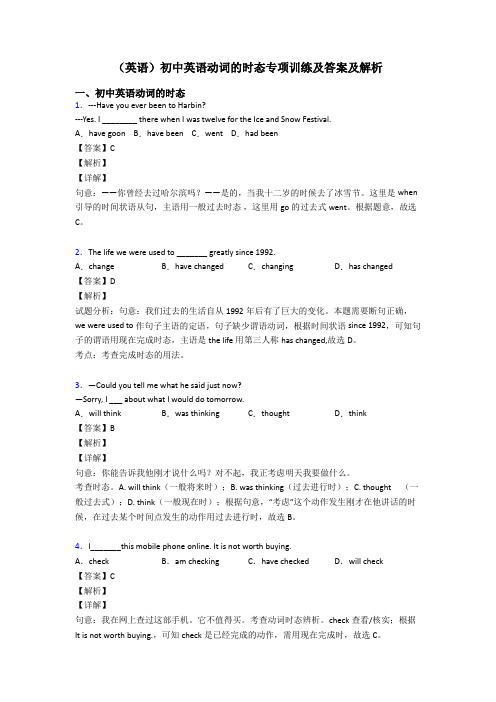
(英语)初中英语动词的时态专项训练及答案及解析一、初中英语动词的时态1.---Have you ever been to Harbin?---Yes. I ________ there when I was twelve for the Ice and Snow Festival.A.have goon B.have been C.went D.had been【答案】C【解析】【详解】句意:——你曾经去过哈尔滨吗?——是的,当我十二岁的时候去了冰雪节。
这里是when 引导的时间状语从句,主语用一般过去时态,这里用go的过去式went。
根据题意,故选C。
2.The life we were used to _______ greatly since 1992.A.change B.have changed C.changing D.has changed【答案】D【解析】试题分析:句意:我们过去的生活自从1992年后有了巨大的变化。
本题需要断句正确,we were used to作句子主语的定语,句子缺少谓语动词,根据时间状语since 1992,可知句子的谓语用现在完成时态,主语是the life 用第三人称has changed,故选D。
考点:考查完成时态的用法。
3.—Could you tell me what he said just now?—Sorry, I ___ about what I would do tomorrow.A.will think B.was thinking C.thought D.think【答案】B【解析】【详解】句意:你能告诉我他刚才说什么吗?对不起,我正考虑明天我要做什么。
考查时态。
A. will think(一般将来时);B. was thinking(过去进行时);C. thought (一般过去式);D. think(一般现在时);根据句意,“考虑”这个动作发生刚才在他讲话的时候,在过去某个时间点发生的动作用过去进行时,故选B。
(英语)初中英语动词的时态专题训练答案及解析

(英语)初中英语动词的时态专题训练答案及解析一、初中英语动词的时态1.Jack ______ a shower when his mother rang him up.A.takesB.has takenC.is takingD.was taking【答案】D【解析】句意:当他妈妈给他打电话的时候杰克正在洗澡。
本句考查过去进行时态。
“他妈妈打电话”是过去的时间,在过去某个时间正在进行的动作,使用过去进行时,故选D。
2.—My grandma looking at that photo on the wall.—I can understand. It helps her remember her childhood.A.enjoys B.enjoyedC.was enjoying D.will enjoy【答案】A【解析】句意:——我奶奶喜欢看墙上的那个照片。
——我能理解,它能帮她想起她的童年。
A. enjoys喜欢,用于一般现在时态,主语单三时; B. enjoyed 喜欢,用于一般过去时态;C. was enjoying 喜欢,用于过去进行时态,主语单三时;D. will enjoy喜欢,用于一般将来时态;根据It helps her remember her childhood.可知用一般现在时态;故选A3.-Has your cousin arrived in Beijing yet?--Yes. She Beijing since yesterday morning.A.arrived in B.has arrived in C.has been in D.has been to【答案】C【解析】句意:你表弟到北京了吗?-是的。
她从昨天起就在北京了。
since yesterday morning自昨天早晨以来,表示的是截止到目前为止的时间段,用于现在完成时态,排除A;arrived为短暂性动词,不能与表示一段的时间状语连用;have been to表示某人去过某地,也不能与表示一段的时间状语连用,故答案为C。
初中英语八大时态练习试题及答案(详解)
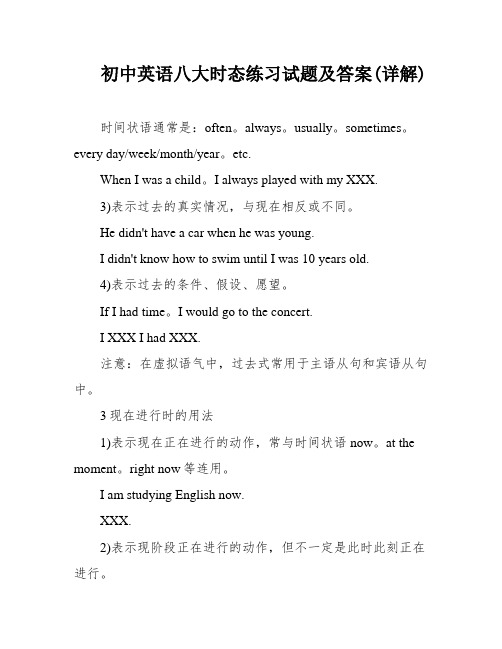
初中英语八大时态练习试题及答案(详解)时间状语通常是:often。
always。
usually。
sometimes。
every day/week/month/year。
etc.When I was a child。
I always played with my XXX.3)表示过去的真实情况,与现在相反或不同。
He didn't have a car when he was young.I didn't know how to swim until I was 10 years old.4)表示过去的条件、假设、愿望。
If I had time。
I would go to the concert.I XXX I had XXX.注意:在虚拟语气中,过去式常用于主语从句和宾语从句中。
3现在进行时的用法1)表示现在正在进行的动作,常与时间状语now。
at the moment。
right now等连用。
I am studying English now.XXX.2)表示现阶段正在进行的动作,但不一定是此时此刻正在进行。
He is learning Chinese this semester.XXX.注意:现在进行时表示的动作必须是正在进行的,而不是已经完成的或惯性的动作。
4过去进行时的用法1)表示过去某一时刻正在进行的动作。
I was watching TV when she called me.They were having dinner at 7 o'clock last night.2)表示过去某段时间内正在进行的动作。
I was XXX.He was working on the project for two weeks.注意:过去进行时强调的是动作的持续性和进行性,常与表示过去的时间状语连用。
5一般将来时的用法1)表示将来某一时刻要发生的动作或存在的状态。
I will go to the beach XXX.She will be 30 years old next month.2)表示将来经常性或惯性的动作。
初中必备英语动词的时态技巧全解及练习题(含答案)含解析
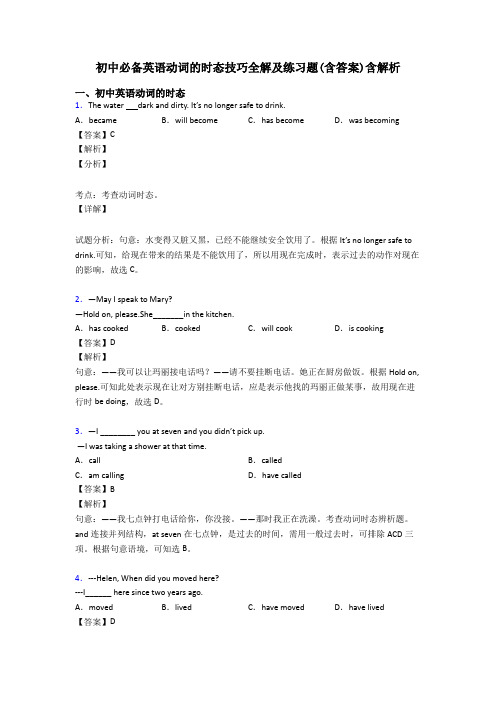
初中必备英语动词的时态技巧全解及练习题(含答案)含解析一、初中英语动词的时态1.The water dark and dirty. It’s no longer safe to drink.A.became B.will become C.has become D.was becoming【答案】C【解析】【分析】考点:考查动词时态。
【详解】试题分析:句意:水变得又脏又黑,已经不能继续安全饮用了。
根据It’s no longer safe to drink.可知,给现在带来的结果是不能饮用了,所以用现在完成时,表示过去的动作对现在的影响,故选C。
2.—May I speak to Mary?—Hold on, please.She_______in the kitchen.A.has cooked B.cooked C.will cook D.is cooking【答案】D【解析】句意:——我可以让玛丽接电话吗?——请不要挂断电话。
她正在厨房做饭。
根据Hold on, please.可知此处表示现在让对方别挂断电话,应是表示他找的玛丽正做某事,故用现在进行时be doing,故选D。
3.—I ________ you at seven and you didn’t pick up.—I was taking a shower at that time.A.call B.calledC.am calling D.have called【答案】B【解析】句意:——我七点钟打电话给你,你没接。
——那时我正在洗澡。
考查动词时态辨析题。
and连接并列结构,at seven在七点钟,是过去的时间,需用一般过去时,可排除ACD三项。
根据句意语境,可知选B。
4.---Helen, When did you moved here?---I______ here since two years ago.A.moved B.lived C.have moved D.have lived【答案】D试题分析:句意:―海伦,你什么时候搬到这儿的?―从两年前我就住在这儿。
必备英语中考英语 动词的时态考点解析(Word版附答案)

必备英语中考英语动词的时态考点解析(Word版附答案)一、初中英语动词的时态1.— Peter, what will you do next Sunday?— We ______ our grandparents.A.visit B.visited C.is visiting D.will visit【答案】D【解析】【详解】句意:彼得,下周日你们打算做什么?—我们要去看望我们的祖父母。
本题考查的是时态的辨析,根据问句中的next Sunday可知,本题是一般将来时,故答案选D。
2.—Shall we play tennis now?—Sorry, I can’t. I my homework.A.do B.did C.have done D.am doing【答案】D【解析】句意:——我们现在打网球去好吗?——对不起,我不能去,我在做作业。
A. do 做,用于一般现在时态,主语复数时; B. did做,用于一般过去时态; C. have done 做,用于一般现在完成时态; D. am doing做,用于现在进行时态,主语是I时;根据now可知用现在进行时态,故选D3.—Linda is not coming for the party tonight.—But she _.A.promises B.promised C.will promise D.had promised【答案】B【解析】【详解】句意:---琳达今晚不来参加晚会了吗?----但她答应了。
考查动词时态。
A. promises一般现在时,第三人称单数;B. promised一般过去时;C. will promise一般将来时;D. had promised过去完成时。
根据上文是现在进行时,结合语境可知原先答应,可知用一般过去时。
故选B。
4.—I ________ you at seven and you didn’t pick up.—I was taking a shower at that time.A.call B.calledC.am calling D.have called【答案】B【解析】句意:——我七点钟打电话给你,你没接。
初中英语语法八大时态总结(附答案)
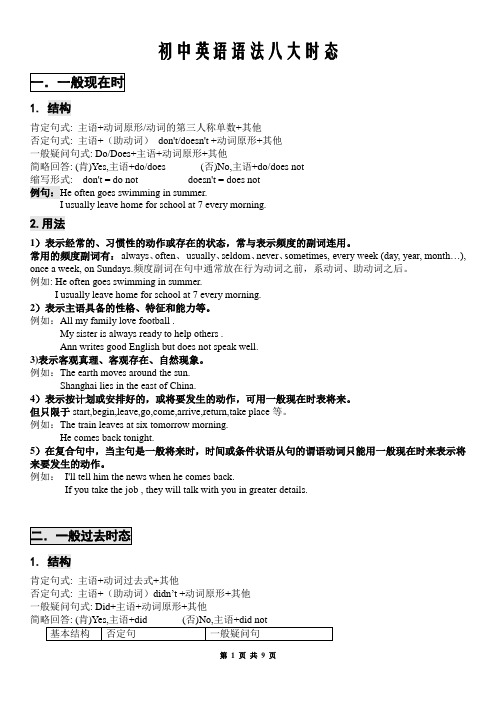
初中英语语法八大时态1.结构肯定句式: 主语+动词原形/动词的第三人称单数+其他否定句式: 主语+(助动词)don't/doesn't +动词原形+其他一般疑问句式: Do/Does+主语+动词原形+其他简略回答: (肯)Yes,主语+do/does (否)No,主语+do/does not缩写形式: don't = do not doesn't = does not例句:He often goes swimming in summer.I usually leave home for school at 7 every morning.2.用法1)表示经常的、习惯性的动作或存在的状态,常与表示频度的副词连用。
常用的频度副词有:always、often、usually、seldom、never、sometimes, every week (day, year, month…), once a week, on Sundays.频度副词在句中通常放在行为动词之前,系动词、助动词之后。
例如: He often goes swimming in summer.I usually leave home for school at 7 every morning.2)表示主语具备的性格、特征和能力等。
例如:All my family love football .My sister is always ready to help others .Ann writes good English but does not speak well.3)表示客观真理、客观存在、自然现象。
例如:The earth moves around the sun.Shanghai lies in the east of China.4)表示按计划或安排好的,或将要发生的动作,可用一般现在时表将来。
初中英语动词的时态试题(有答案和解析)及解析
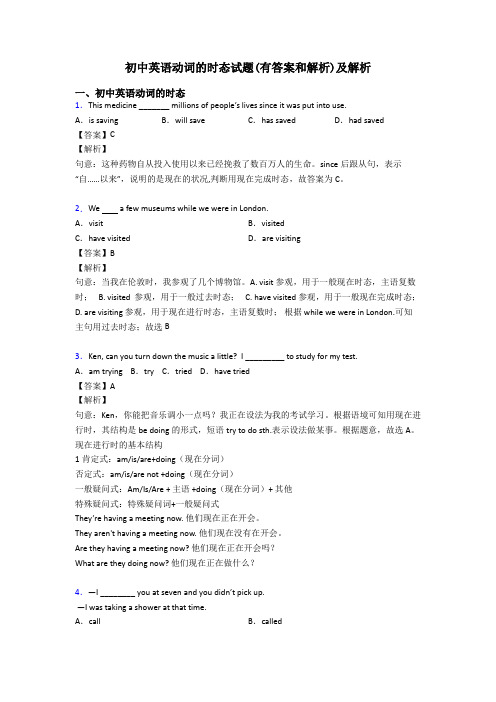
一、初中英语动词的时态
1.This medicine _______ millions of people’s lives since it was put into use.
A.is savingB.will saveC.has savedD.had saved
【答案】B
【解析】
句意:当我在伦敦时,我参观了几个博物馆。A. visit参观,用于一般现在时态,主语复数时;B. visited参观,用于一般过去时态;C. have visited参观,用于一般现在完成时态;D. are visiting参观,用于现在进行时态,主语复数时;根据while we were in London.可知主句用过去时态;故选B
—I was taking a shower at that time.
A.callB.called
C.am callingD.have called
【答案】B
【解析】
句意:——我七点钟打电话给你,你没接。——那时我正在洗澡。考查动词时态辨析题。and连接并列结构,at seven在七点钟,是过去的时间,需用一般过去时,可排除ACD三项。根据句意语境,可知选B。
They aren't having a meeting now.他们现在没有在开会。
Are they having a meeting now?他们现在正在开会吗?
What are theI ________ you at seven and you didn’t pick up.
10.---Did you watch the program The Voice last night?
---I wanted to, but my mother __________her favorite TV play.
中考英语试卷分类汇编英语动词的时态(及答案)及解析

+was/were+ 动词的现在分词,主语是第三
人称单数所以 be 动词用 was, cook 的现在分词是 cooking;故答案选 D。
4.– What’ s your father doing now?He ______–the room.
A. cleaned 【答案】 D
B. cleans
C. has cleaned
A. has cooked B. cooked C.have cooked D. had cooked
【答案】 D
【解析】句意:我起床的时候,妈妈已经做好早饭了。考查动词时态辨析题。
等到 / 到 …时候为止,用于表示一段时间,主句需用完成时。根据从句时态(
式),结合句意语境,可知用过去完成时,即
had+过去分词结构,故选
A. waited B.waits C. is waiting D. was waiting 【答案】 D
【解析】句意:当雨下得很大时,她正在公共汽车站等公共汽车。
A. waited 一般过去时;
B. waits 一般现在时; C. is waiting 现在进行时; D. was waiting 过去进行时。 when 引导的时
中考英语试卷分类汇编英语动词的时态 ( 及答案 ) 及解析
一、初中英语动词的时态
1.—What do you often do at weekends?
—I often ________ visit
B. visited
【答案】 A
C. have visited
D. will visit
过”之意,表示经验; have been to 的意思是 “过去到过而现在已返回 ”,它强调 “最近的经
【英语】初中英语动词的时态专项训练100(附答案)及解析
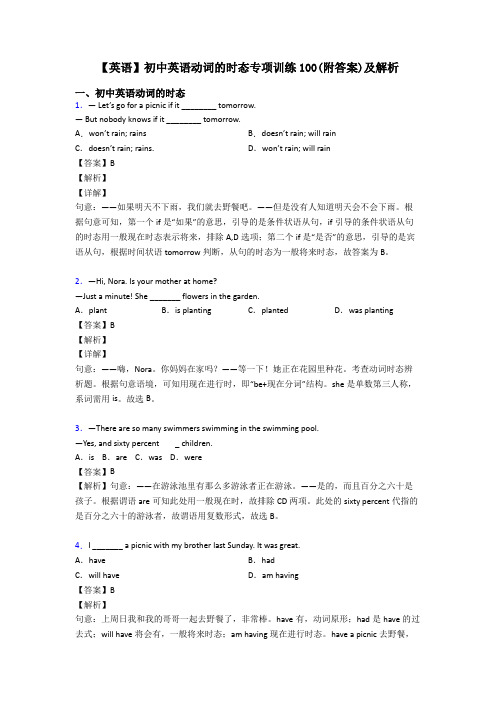
A.produces,was produced B.was produced,produces
C.produces,produces D.was produced,produced
【答案】A
13.In the past few years, many schools ______ the ways of doing morning exercises.
A.changeB.changesC.will changeD.have changed
【答案】D
【解析】
试题分析:句意:在过去的几年里,很多学校已改变了做早操的方式。根据时间状语In the past few years可知,本题用现在完成时。故选D。
一Yes. Ithere many times.
A.went; have been B.have gone; went
C.went; have gone D.have been;went
【答案】A
【解析】句意:-桂林是个很棒的地方。我多年前去过那里。-是的。我去过那里很多次。many years ago很多年前,跟一般过去时态连用,所以谓语动词使用go的过去式went。下文表示过去的动作对现在造成的影响与结果,所以谓语动词使用现在完成时态,have/has+动词的过去分词,have/has been to.. ,意为“曾经去过某地”,有“去过某地”的经历; have/has gone to…,意为“去了某地”,人不在说话地点。本句表示“曾经去过某地”。故选:A。
5.—Why didn't you open the door for me just now?
初中英语一般现在时态讲解与习题附答案

一般现在时1概念引入在英语中,不同时间发生的动作和情况,要用不同的动词形式表示,这种不同的动词形式叫做动词的时态。
今天我们要学习的是一般现在时。
2用法讲解一、一般现在时的使用范围。
1. 表示现在的状态。
例如:I’m twelve. 我十二岁。
Where’s the schoolbag? 书包在哪里?2. 表示经常或者习惯性的动作。
例如:I have lunch every day. 我每天吃午饭。
Gina always asks: “Where is my schoolbag?”Gina总是问:“我的书包在哪里啊?”3. 表示客观事实或者存在。
例如: My sister is a teacher. 我姐姐是一位老师。
The earth turns around the sun. 地球绕着太阳转。
4. 表示主语所具备的性格和能力。
例如:She likes English very much. 她很喜欢英语。
Bill likes beef, but he doesn’t like chicken.比尔喜欢牛肉但是不喜欢鸡肉。
以上所述均是一般现在时的基本使用范围,除此之外一般现在时还有其他一些特殊用法,比如:一般现在时可以用在一些从句中表将来等,我们会在以后的学习中讲到。
注意:一般现在时态经常与often(经常),sometimes(有时),always(总是),usually (通常)等副词连用,也经常与every day(每天), every week(每周), every month (每月), every term(每学期), every year(每年), once a week(一周一次),twice a year(一年两次)等时间状语连用。
例如:She gets up early every morning. 她每天早上早起。
I go to see my grandmother every month. 我每个月都去看我的奶奶。
初中英语八大时态总结(精讲、习题、答案)
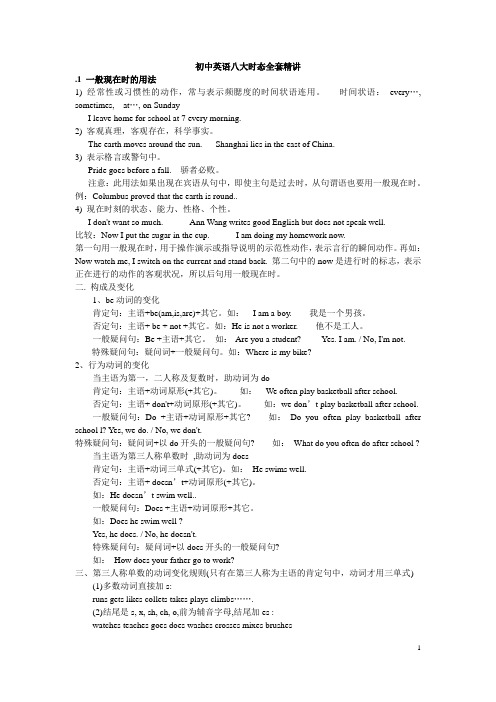
初中英语八大时态全套精讲.1 一般现在时的用法1) 经常性或习惯性的动作,常与表示频腮度的时间状语连用。
时间状语:every…, sometimes,at…, on SundayI leave home for school at 7 every morning.2) 客观真理,客观存在,科学事实。
The earth moves around the sun.Shanghai lies in the east of China.3) 表示格言或警句中。
Pride goes before a fall.骄者必败。
注意:此用法如果出现在宾语从句中,即使主句是过去时,从句谓语也要用一般现在时。
例:Columbus proved that the earth is round..4) 现在时刻的状态、能力、性格、个性。
I don't want so much. Ann Wang writes good English but does not speak well.比较:Now I put the sugar in the cup.I am doing my homework now.第一句用一般现在时,用于操作演示或指导说明的示范性动作,表示言行的瞬间动作。
再如:Now watch me, I switch on the current and stand back. 第二句中的now是进行时的标志,表示正在进行的动作的客观状况,所以后句用一般现在时。
二. 构成及变化1、be动词的变化肯定句:主语+be(am,is,are)+其它。
如:I am a boy.我是一个男孩。
否定句:主语+ be + not +其它。
如:He is not a worker.他不是工人。
一般疑问句:Be +主语+其它。
如:-Are you a student?-Yes. I am. / No, I'm not.特殊疑问句:疑问词+一般疑问句。
(英语)初中英语动词的时态专题训练答案及解析
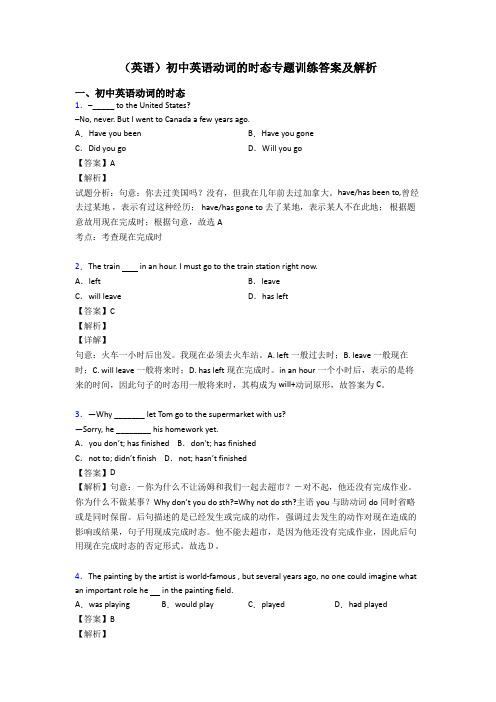
(英语)初中英语动词的时态专题训练答案及解析一、初中英语动词的时态1.–_____ to the United States?–No, never. But I went to Canada a few years ago.A.Have you been B.Have you goneC.Did you go D.Will you go【答案】A【解析】试题分析:句意:你去过美国吗?没有,但我在几年前去过加拿大。
have/has been to,曾经去过某地,表示有过这种经历; have/has gone to 去了某地,表示某人不在此地;根据题意故用现在完成时;根据句意,故选A考点:考查现在完成时2.The train in an hour. I must go to the train station right now.A.left B.leaveC.will leave D.has left【答案】C【解析】【详解】句意:火车一小时后出发。
我现在必须去火车站。
A. left一般过去时;B. leave一般现在时;C. will leave一般将来时;D. has left现在完成时。
in an hour一个小时后,表示的是将来的时间,因此句子的时态用一般将来时,其构成为will+动词原形,故答案为C。
3.—Why _______ let Tom go to the supermarket with us?—Sorry, he ________ his homework yet.A.you don’t; has finished B.don't; has finishedC.not to; didn’t finish D.no t; hasn’t finished【答案】D【解析】句意:-你为什么不让汤姆和我们一起去超市?-对不起,他还没有完成作业。
你为什么不做某事?Why don’t you do sth?=Why not do sth?主语you与助动词do同时省略或是同时保留。
(详细版)初中英语动词时态和语态讲解
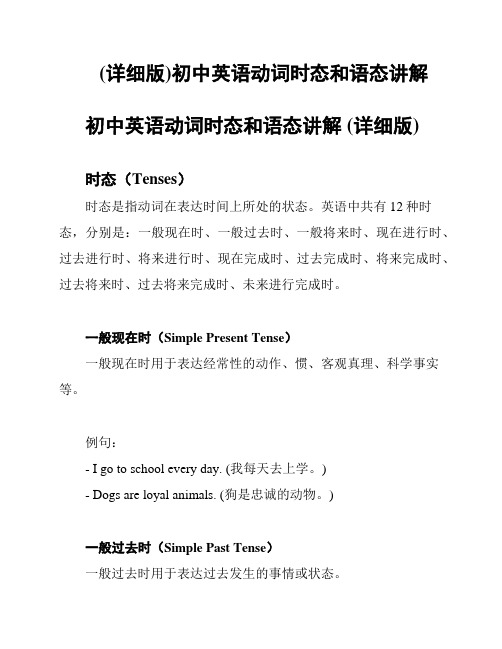
(详细版)初中英语动词时态和语态讲解初中英语动词时态和语态讲解 (详细版)时态(Tenses)时态是指动词在表达时间上所处的状态。
英语中共有12种时态,分别是:一般现在时、一般过去时、一般将来时、现在进行时、过去进行时、将来进行时、现在完成时、过去完成时、将来完成时、过去将来时、过去将来完成时、未来进行完成时。
一般现在时(Simple Present Tense)一般现在时用于表达经常性的动作、惯、客观真理、科学事实等。
例句:- I go to school every day. (我每天去上学。
)- Dogs are loyal animals. (狗是忠诚的动物。
)一般过去时(Simple Past Tense)一般过去时用于表达过去发生的事情或状态。
例句:- We visited Paris last summer. (去年夏天我们参观了巴黎。
)- She lived in Japan for two years. (她在日本住了两年。
)一般将来时(Simple Future Tense)一般将来时用于表达将来将要发生的事情或状态。
例句:- I will call you tomorrow. (我明天会打电话给你。
)- They are going to travel to Europe next month. (他们下个月要去欧洲旅行。
)现在进行时(Present Continuous Tense)现在进行时用于表达正在进行的动作。
例句:- She is studying for her exams. (她正在为考试而研究。
)- They are playing soccer in the park. (他们正在公园里踢足球。
)过去进行时(Past Continuous Tense)过去进行时用于表达过去某个时间正在进行的动作。
例句:- We were watching a movie when the power went out. (停电时我们正在看电影。
初中英语八大时态讲解及练习(含答案)
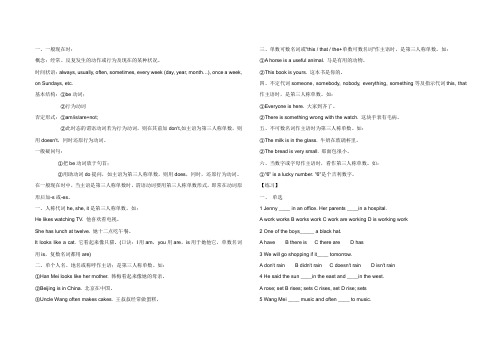
一、一般现在时:概念:经常、反复发生的动作或行为及现在的某种状况。
时间状语:always, usually, often, sometimes, every week (day, year, month…), once a week, on Sundays, etc.基本结构:①be动词;②行为动词否定形式:①am/is/are+not;②此时态的谓语动词若为行为动词,则在其前加don't,如主语为第三人称单数,则用doesn't,同时还原行为动词。
一般疑问句:①把be动词放于句首;②用助动词do提问,如主语为第三人称单数,则用does,同时,还原行为动词。
在一般现在时中,当主语是第三人称单数时,谓语动词要用第三人称单数形式,即常在动词原形后加-s或-es。
一、人称代词he, she, it是第三人称单数。
如:He likes watching TV. 他喜欢看电视。
She has lunch at twelve. 她十二点吃午餐。
It looks like a cat. 它看起来像只猫。
(口诀:I用am,you用are,is用于她他它,单数名词用is,复数名词都用are)二、单个人名、地名或称呼作主语;是第三人称单数。
如:①Han Mei looks like her mother. 韩梅看起来像她的母亲。
②Beijing is in China. 北京在中国。
③Uncle Wang often makes cakes. 王叔叔经常做蛋糕。
三、单数可数名词或"this / that / the+单数可数名词"作主语时,是第三人称单数。
如:①A horse is a useful animal. 马是有用的动物。
②This book is yours. 这本书是你的。
四、不定代词someone, somebody, nobody, everything, something等及指示代词this, that 作主语时,是第三人称单数。
中考英语动词的时态答题技巧及练习题(含答案)
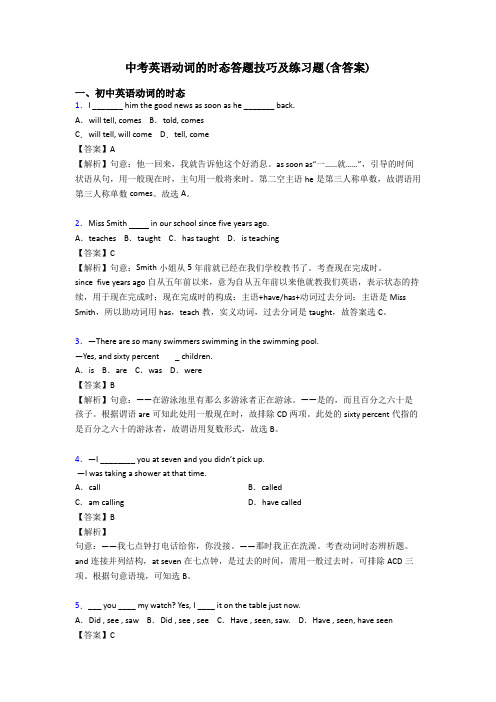
中考英语动词的时态答题技巧及练习题(含答案)一、初中英语动词的时态1.I _______ him the good news as soon as he _______ back.A.will tell, comes B.told, comesC.will tell, will come D.tell, come【答案】A【解析】句意:他一回来,我就告诉他这个好消息。
as soon as“一……就……”,引导的时间状语从句,用一般现在时,主句用一般将来时。
第二空主语he是第三人称单数,故谓语用第三人称单数comes。
故选A。
2.Miss Smith in our school since five years ago.A.teaches B.taught C.has taught D.is teaching【答案】C【解析】句意:Smith小姐从5年前就已经在我们学校教书了。
考查现在完成时。
since five years ago自从五年前以来,意为自从五年前以来他就教我们英语,表示状态的持续,用于现在完成时;现在完成时的构成:主语+have/has+动词过去分词;主语是Miss Smith,所以助动词用has,teach教,实义动词,过去分词是taught,故答案选C。
3.—There are so many swimmers swimming in the swimming pool.—Yes, and sixty percent _ children.A.is B.are C.was D.were【答案】B【解析】句意:——在游泳池里有那么多游泳者正在游泳。
——是的,而且百分之六十是孩子。
根据谓语are可知此处用一般现在时,故排除CD两项。
此处的sixty percent代指的是百分之六十的游泳者,故谓语用复数形式,故选B。
4.—I ________ you at seven and you didn’t pick up.—I was taking a shower at that time.A.call B.calledC.am calling D.have called【答案】B【解析】句意:——我七点钟打电话给你,你没接。
初中英语时态讲解(完整版)
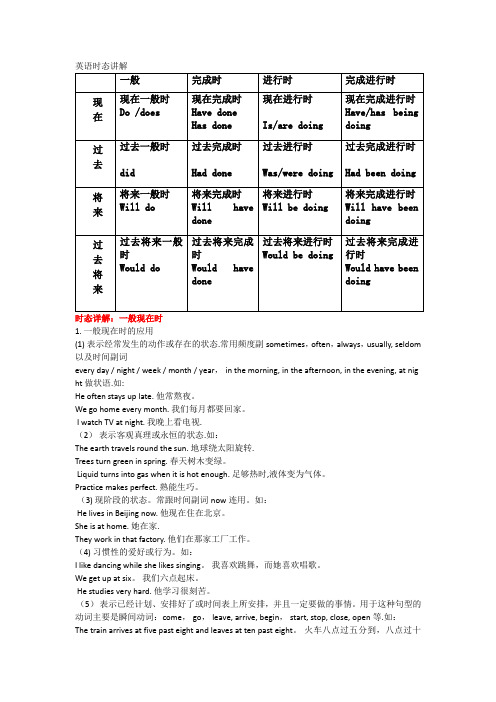
英语时态讲解1.一般现在时的应用(1)表示经常发生的动作或存在的状态.常用频度副sometimes,often,always,usually,seldom 以及时间副词every day/night/week/month/year,in the morning,in the afternoon,in the evening,at nig ht做状语.如:He often stays up late.他常熬夜。
We go home every month.我们每月都要回家。
I watch TV at night.我晚上看电视.(2)表示客观真理或永恒的状态.如:The earth travels round the sun.地球绕太阳旋转.Trees turn green in spring.春天树木变绿。
Liquid turns into gas when it is hot enough.足够热时,液体变为气体。
Practice makes perfect.熟能生巧。
(3)现阶段的状态。
常跟时间副词now连用。
如:He lives in Beijing now.他现在住在北京。
She is at home.她在家.They work in that factory.他们在那家工厂工作。
(4)习惯性的爱好或行为。
如:I like dancing while she likes singing。
我喜欢跳舞,而她喜欢唱歌。
We get up at six。
我们六点起床。
He studies very hard.他学习很刻苦。
(5)表示已经计划、安排好了或时间表上所安排,并且一定要做的事情。
用于这种句型的动词主要是瞬间动词:come,go,leave,arrive,begin,start,stop,close,open等.如:The train arrives at five past eight and leaves at ten past eight。
初中八大英语时态(答案)

初中八大英语时态(答案)初中英语时态英语八大时态一般现在时一般过去时现在进行时过去进行时一般将来时过去将来时现在完成时过去完成时(一)一般现在时用法:1、经常性或习惯性的动作,常与表示频率的时间状语连用。
时间状语:every, sometimes, alwayseg. I get up at 7 every morning.2、客观真理,客观存在,科学事实。
eg. The earth moves around the sun.结构:V原注意:第三人称Practice I: 填空1. Daniel watches TV every evening.(改为否定句)Daniel doesn’t watch TV every evening.2. I do my homework every day .(改为一般疑问句并作否定回答)Do you do your homework every day?No, I don’t.3. She likes milk.(改为一般疑问句并作肯定回答)Does she like milk?Yes, she does.Practice II: 改错1. Lily and Lucy doesn’t want to clean the blackboard. doesn’t 改成don’t2. Mr. Green likes work in China very much. work改成to work或者working3. My mother often go to the shop on Sundays. go 改成goes4. She doesn’t likes bread or cakes. likes 改成like5. Where is Jim and Kate now? is 改成are6. There are some water and leaves in the pool. are改成is(二)一般过去时用法:1、在确定的过去时间里所发生的动作或存在的状态。
英语动词的时态题20套(带答案)及解析
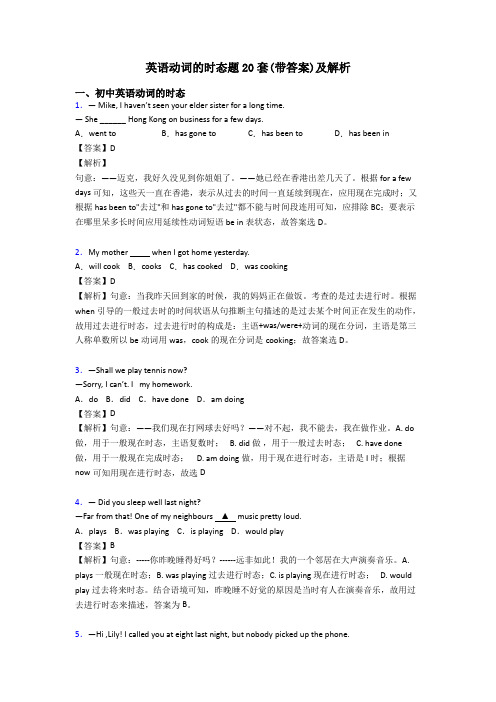
A.goesB.is goingC.has goneD.has been
【答案】C
【解析】
【详解】
句意:——我的父亲在哪里?可以告诉我吗?——他已经去北京了。他将参加一个重要会议。考查动词时态辨析。根据句意语境,可知父亲不在说话的地点已经去了北京,需用现在完成时,可排除AC两项。have been to意为“曾经去过某地”,现在已不在那里了;have gone to意为“到某地去了”,说话时作句子主语的人不在现场,故选C。
7.Neither Amy nor her parents ______ to Australia, but _______ of them know Australian customs very well.
A.have been, allB.have been, bothC.has been, neitherD.has been, none
—There_____ a talent show in ten minutes.
A.will haveB.will be
C.is going to haveD.are going to be
【答案】B
【解析】
【分析】
考点:考查一般将来时。
【详解】
试题分析:句意:——你为什么走那么快,爱德华?——十分钟后就有个才艺表演。根据时间状语in then minutes十分钟后,句子要用一般将来时;句型there be有……;其一般将来时结构为there will be或there is/are going to be,根据主语a talent show单数,所以用is,故C和D不对,故选B。
- 1、下载文档前请自行甄别文档内容的完整性,平台不提供额外的编辑、内容补充、找答案等附加服务。
- 2、"仅部分预览"的文档,不可在线预览部分如存在完整性等问题,可反馈申请退款(可完整预览的文档不适用该条件!)。
- 3、如文档侵犯您的权益,请联系客服反馈,我们会尽快为您处理(人工客服工作时间:9:00-18:30)。
初中时态前80满分:班级:_________ 姓名:_________ 考号:_________一、单选题(共80小题)1.I the water until it is boiled. I think it is good for my health.A.won’t drinkB.drinkC.didn’t drink2.—I can't find Tara.Where is she?—She ______ the piano in the music room.A.plays B.is playingC.was playing D.played3.I wonder when mom __________ back . When she __________, dad will pick her up at the airport .A.will come ; will arrive B.comes ; arrivesC.will come ; arrives D.comes ; will arrive4.—I miss my brot her . It’s a long time since he le ft China .—How many years __________ he __________ ?A.did, leave B.has, leftC.has, been away D.will, leave5.—Mike, I called out your name but you didn’t even look at me .—Sorry, I __________ about a math problem . Math usually drives me crazy .A .thoughtB .was thinkingC .will thinkD .think6.The man ________ in 1984.He ________ for thirty years .A .died; was deadB .died; has been deadC .was dead; has diedD .was dead; has been died7.Mr Black ________ China since the summer of 1998.8.--Have you ever ________ to Haikou?--Yes ,I ________ there with my family last August .A .gone; wentB .been; wentC .been ;went toD .gone; was in9.—What happened to Jack?—He ________ trouble since he stayed out late to play computer games last time.A .has got intoB .has been inC .got intoD .was inA .has been toB .has been inC .has come toD .came to10.—Has Jack finished painting the picture yet?—I’ve no idea. But he______ it the whole morning.A.was painting B.paintedC.had painted D.have painted11.—Sam, do you know if Alice _________ to my party next week?—I think she will come if she _________.A.comes; is invited B.comes; will be invitedC.will come; is invited D.will come; will be invited 12.Here’s a good p iece of news. All the students in our class have the exam. A.past B.passedC.passing D.to pass13.I _______ my country for a long time.A.left B.have leftC.have been awayD.have leavefrom14.Our teachers are very friendly to us. We _______ friends since three years ago. A.have been B.have becomeC.would be D.become15.What colour do you think_____ you feel calm?A.making B.makesC .to makeD .make16.I _______to the shop with Danny. We bought some gifts .A .goB .wentC .goesD .going17.I ____going to watch more sports on TVA .areB .amC .doD .not18.Sometimes , they ______each other a sport .A .teachB .taughtC .teachesD .teaching19.Look! My grandmother _______ now.A .is danceB .dancingC .is dancingD .is danceing20.I ________you yesterday afternoon ,but you ________at home.21.She_______ at home last night.A .doesn’t stayB .didn’t stayC .didn’t stayedD .doesn’t stayed22.–How time flies! A two-month holiday ______.–Let’s wish everybody happiness and good on their way to _______ in the new term.A .call ,aren’tB .am calling ,aren’tC .called ,wasD .called ,weren’tA.has passed, luck, successB.passed, lucky, successC.past, luckily, succeed23.The Whites there ever since they moved to Tianjin. A.live B.are livingC.have lived D.lived24.Our teacher told us that light much faster than sound. A.traveled B.travelsC.is traveled D.was traveling25.—What’s your plan for this weekend?—We __________ a picnic with our classmates.A.are having B.are going to haveC.had D.have26.—Where is Tom?—He __________ basketball with his classmates over there. A.is playing B.playC.plays D.played27.My mum often me do my lessons after school. A.makes B.makeC.has made D.is making28.—I think I’ll wear jeans to the party?—That’s not a good idea. If you do, the teacher you in.A.won’t letB.doesn’t letC.didn’t let29.I don’t feel well, Jack. I’m afraid you __________ me your cold.A.give B.had givenC.have given D.would give30.— So sorry, Tom. I can’t find the book you __________ me.—It’s OK. I don’t need it anymore.A.lend B.have lentC.will lend D.lent31.I will go shopping with you if it tomorrow.A.will not rainB.doesn’t rainC.rain32.The girl ________ an English song in the next room is Tom’s sister.A.who is singing B.is singingC.sang D.was singing33.—______ you______ a meeting last Monday?—Yes, and it ______ me three hours to get ready for it.A.Were, have; spent B.Did, had; takeC.Did, have; took D.Were, had; spent34.How your winter holiday?—It great. But I tired nowA.was, was, am B.is , was, wasC.is, is , am D.is, is , was35.—I am so hungry now.—When did you ______ breakfast?— Four hours_________!A.had; before B.eat; nowC.have; ago D.ate; after36.—Tony, why are you so glad?—Oh, you know, there ___________ a football match tomorrow.A.are going to have B.is going to beC.is going to have D.are going to be37.Mike _______ the army for many years, but his spirit is still encouraging us. A.joined B.has joinedC.was in D.has been in38.Look at the poster! It says that there _______ a concert in our school next Saturday.A.is B.will haveC.will be D.is going to have39.Next month,we’re going somewhere interesting as soon as the holiday . A.will begin B.has begunC.begins D.is beginning40.— Come and join us, Ben!—I’m afraid I can’t. I’m too busy now. If I __ time, I would certainly go. A.had B.will haveC.have had D.have41.Tourists’ bad behavior by the government in our country from now. A.will record B.is recordedC.records D.will be recorded42.— The food looked bad, but it ________ OK.—So we can’t judge a man by his appearance.A.is tasted B.tastedC.was tasted D.taste43.I the book club last week and I two books already.A.joined; have read B.join; readC.joined; read D.join;has read44.The doctor _______ a ______woman several days ago.A.had saved, dying B.saved, deadC.saved, dying D.has saved, dying45.— How do you like your English teacher?— He is great. We friends since three years ago.A.were B.have madeC.have been D.have become46.Our English teacher ____ in our school for about 20 years so far.A.works B.has workedC.worked D.will work47.I have to be off now. My friends _____outside.A.wait B.are waitingC.have waited D.were waiting48.Hurry up! The film ________ for ten minutes.A.has been on B.beganC.had began D.has begun49.—What are you going to do next week?—If I _______, I’ll visit my grandparents.A.won’t be bu sy B.won’t be freeC.am free D.am busy50.—Why are you so excited?—I_______ Lang Lang’s Piano Concert in Beijing tomorrow.A.was going B.went toC.am going to D.have gone to51.—Has the match started?—Started? Finished! Guo yue_______.A .is winningB .winsC .will winD .has won52.—What under your bed, Nick?—Oh, where is my basketball, Dad?53.—Hello Mum , Are you still on Lushan Mountain?—Oh ,no .We are back home .We __________ a really good journey .A .haveB .hadC .are havingD .will have54.—I have bought a Chinese – English dictionary . —When and where__________ you __________it?A .have, boughtB .did, buyC .will, buyD .do, buy55.Johnson______ two tickets for the concert before Joe made a phone call to him .A .had bookedB .bookedC .has bookedD .were boo king56.—Hobo and Eddie the cinema to watch the film Zootopia .—Oh , that’s why I can’t find them now .A .have gone toB .have been toA .do you doB .are you doingC .have you doneD .did you doC.has gone to D.has been to57.Our teacher often advises us the habit of making notes while reading .A.to develop B.developC.to developing D.developing58.— Oh , dear ! A power cut !—Sorry , I didn’t know you the washing machine .A.are using B.usedC.use D.were using59.—Today’s young people can’t live without smarrt phones.—They keep their hands on the phones whether they go, even while they meals. A.have B.are havingC.were having D.will have60.—I don’t know if it _________tomorrow.—Well, if it __________, the school sports meet will be canceled.A.will rain; will rain B.rains; will rainC.will rain; rains D.rains; rains61.I_________you can finish the exam in two hours.A.does believe B.do believeC.did believed D.do believed62.My sister with my parents_____dumplings when I got home yesterday evening.A.are making B.is makingC.was making D.were making63.We haven’t seen him .A.since almost a year B.from almost a year onC.after almost a year D.since almost a year ago 64.Great changes ______in the last three years.A.have taken place B.have been taken place C.have happened D.have been happened65.—Are you going anywhere for a holiday this summer?— Yes, I ______ a plan already.A.make B.will makeC.have made D.am making66.—I called you last nigh t but you didn’t answer the phone.— About 8:00? Oh, I ______ with my family at Wal-Mart at that time. A.shop B.shoppedC.was shopping D.have shopped67.John in Beijing for five years already.A.lives B.will liveC.is living D.has lived68.一What does David often do at weekends一He often mountains with his friends.A.climbs B.climbedC.will climb D.is climbing69.Kobe Bryant _______basketball in NBA since1996 A.has played B.will playC.play D.played70.—What were you doing at 9 o’clock last night?—I _______ TV.A.watch B.watchedC.was watching D.is watching71.He playing the music for the show since last month. A.practices B.practicedC.has practiced D.was practicing72.Peter and Linda Beijing for Shanghai yesterday afternoon. A.leave B.leftC.have left D.will leaveA.study B.studiedC.will study D.have studied73.We in the same schoolsince three years ago.74.一Where is Joe?一He TV in the sitting room now.A.watches B.watchedC.is watching D.will watch75.— Are you going anywhere for a holiday this summer?—Yes, I ______ a plan already.A.make B.will makeC.have made D.am making76.—I called you last night but you didn’t answer the phone.—About 8:00? Oh, I ______ with my family at Wal-Mart at that time.A.shop B.shoppedC.was shopping D.have shopped77.The 24th Winter Olympic Games _______in Beijing in 2022.A.held B.holdC.are held D.will be held78.My father is a policeman.He_________in that station since 2008.A.works B.has workedC.will work D.worked79.—What are the students doing there?—They________the big English Drama Show.A.are watching B.watchedC.watch D.will watch80.-Where is your brother?-He has gone to Shanghai.He_________ back next week.A.comes B.has comeC.came D.will come答案部分1.考点:一般将来时试题解析:not...until:直到。
